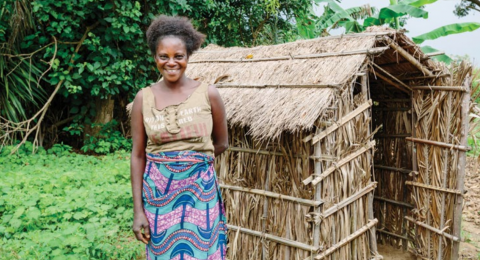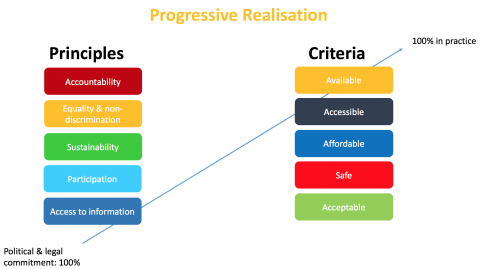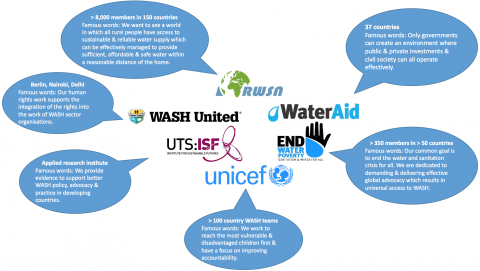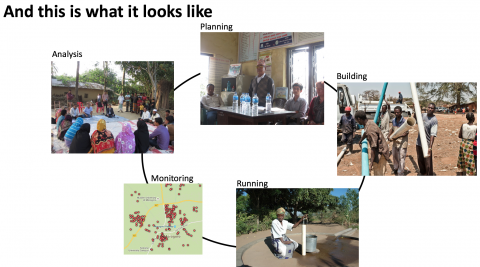
End Water Poverty has organised a webinar series for Water Action Month. On Thursday 16th of March, EWP welcomed Virginia Roaf, former assistant of the UN Human Right to Water and Sanitation Special Reporter and consultant for the Sanitation and Water for All Partnership, to discuss the realisation of the Human Right to Water and Sanitation. Discussing this Human Right was especially pertinent within the context of Water Action Month and the preparatory process for the High Level Meetings. The Human Right to Water and Sanitation approach is central in the progress towards the achievement of the sixth Sustainable Development Goal. Both the human right approach and the SDG 6 advocate for a universal access to safe and affordable water and access to adequate and equitable sanitation and hygiene for all and end of open defecation.
As Virginia Roaf highlighted during the webinar, the SDGs have wider targets than the MDGs, which didn’t take into account the safety and the affordability of water and sanitation. As such, these goals are also more difficult to achieve as they require an universal access with equity and equality. Thus, the challenge by 2030 is to reach the most vulnerable who do not have access to a safe and affordable water and to adequate and equitable sanitation and hygiene.
 Criteria of the Human Right to Water and Sanitation
Criteria of the Human Right to Water and Sanitation
Achieving the SDGs should be tackled with a Human Rights lens: As the SDGs promote universal access to safe and affordable water and to adequate and equitable sanitation and hygiene for all, they are following the human rights framework. This Human Rights approach relies heavily on governments’ responsibilities. By recognising water and sanitation as human rights, people are defined as rights-holders and States as duty-bearers of water and sanitation service provision. This means that the provision of water and sanitation is not a matter of charity – but a legal obligation. Rights-holders can claim their rights and duty-bearers must guarantee the rights to water and sanitation – like other human rights – equally, without discrimination and on the basis of participation and accountability. As Virginia Roaf highlighted in the webinar, governments are requested to look much more to those who are most vulnerable, or the furthest behind with regards to access to water and sanitation.
Virginia Roaf exposed the 5 principles promoted by the Human Rights approach to achieving the SDGs:
- Information: people have the right to know that access to water and sanitation is a Human Right, but they also have the right to know what policies are in place for them to get access to water and sanitation.
- Participation: people should be able to participate in the decision-making concerning their water and sanitation services.
- Sustainability: this is an important criteria, as many facilities are being wrongly recorded as “functioning,” when in fact they are broken or out of order. This therefore does not reflect the reality and needs of populations.
- Equality and non-discrimination: to achieve universal access, everyone should have access to WASH services, no matter their gender, social class, ethnic group or any other discriminatory criteria.
- Accountability: Governments have to show that they do everything in their power to reach all, including the most marginalised and vulnerable segments of the population.
Governments hence have an obligation to follow these principles, and at the very least to show that their policies and plans take into account a thorough path towards achieving this right.
 Who are the organisations and what in our visions or strategies makes us work on this project?
Who are the organisations and what in our visions or strategies makes us work on this project?
Considering this approach, Virginia Roaf presented the joint initiative by UNICEF, EWP, WaterAid and other INGOs which aims at bringing the human rights to government in such a way that they use them. They identified that the people with the most responsibility for delivering human rights are service providers, particularly local governments who are key in this process. The group provided material to the local governments to help them understand what Human Rights are and why they are important. If the stakeholders implementing the SDGs understand the Human Rights approach, they could use the human rights approach as a means for implementing the SDGs.
 Help influence conversations by getting involved!
Help influence conversations by getting involved!
The second part of the webinar addressed the role of governments. The discussion expressed the feeling that governments are more committed to SDGs implementation than adopting a Human Rights approach. Al-Hassan Adam, International Coordinator of EWP, advocated that the only way that we could have a sustainable implementation of SDGs is when there is a proactive civil society pushing their governments to implement plans towards the SDGs that take into account the Human Rights approach. People need to call for their rights. Mobilizing, collaborating, and keeping the pressure on governments is the only way to make the progress towards SDGs viable.
The conclusion of this webinar was that progressing towards the achievement of the SDGs would mean making steps to realise the Human Right to Water and Sanitation. Therefore, both approaches are complementary and should be used to reinforce each other.
Click here to view the webinar recording.
Click here to download the manual, guide and poster: “Clarifying human rights to local government officials”.
Click here to download the human right to water and sanitation handbook.